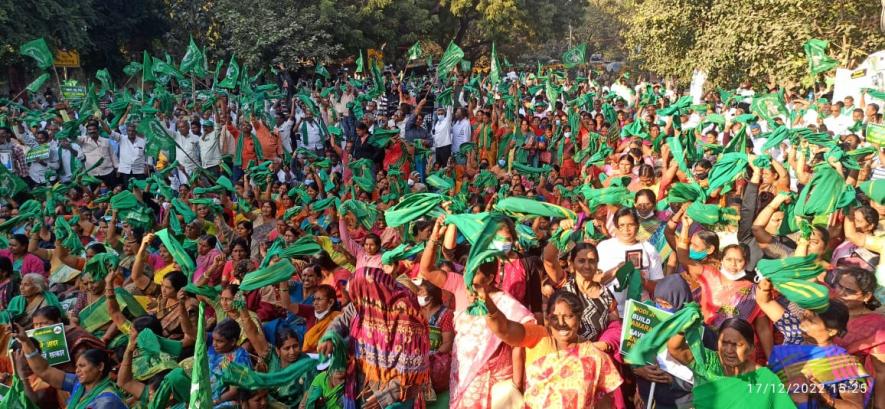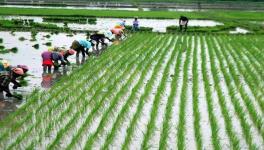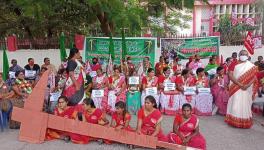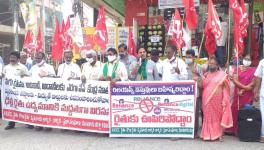36% Farmers in Telangana Tenant Cultivators, Excluded from Govt Support: Survey

About 36% of farmers in Telangana are tenant cultivators and are excluded from all government support systems, suggested a survey report released by Rythu Swarajya Vedika (RSV).
In a press release about the survey report, the RSV said that the survey covered 7,744 farmers from 34 villages in 20 districts in Telangana and found out that 2,753 out of 7744 were tenant farmers cultivating leased land. It has projected the total number of tenant farmers across the state to be 22 lakh – double the estimate by the NSSO.
The survey also found that 19% of the tenant farmers were landless. While 81% of the tenant farmers owned some land, the average of land owned per farmer was 2.3 acres. The average for the leased land, on the other hand, was 5.1 acres.
Explaining the context of the survey, RSV said, “[W]hile we observe the increasing extent of tenant farmers cultivating leased land at the field level, the Telangana state government has excluded them from all their support systems. The government has declared an explicit stand that their schemes are meant only for land-owning farmers and not for tenant farmers – saying that taking care of tenant farmers is not the government’s responsibility. Though its flagship Rythu Bandhu cash transfer scheme is explicitly declared as an “investment support” scheme to help the farmers pay for the costs of inputs and cultivation, the money goes only to the land owners (pattadars) even if they are not cultivating the land, while excluding the actual cultivators.”
It noted that the central government also does not include tenant farmers in its flagship PM-KISAN cash support scheme.
One of the important findings of the survey was the average debt due to cultivation for tenant farmers was Rs 2.7 lakh, of which Rs 2 lakh (75%) was from private sources at high-interest rates (24% to 60%). Apart from this, over 44% of the tenant farmers couldn’t sell their crop at MSP because procurement has been tied to land ownership.
Read the summary and some of the key findings of the survey below:
Rythu Swarajya Vedika (RSV) released the report of its first-of-its-kind extensive study of tenant farmers in Telangana, at a Roundtable meeting in Hyderabad at the Sundarayya Vigyana Kendram on December 14, 2022. The meeting was attended by senior farmer union leaders, representatives of political parties, academics, social activists and farmers.
The context of the study is that while we observe increasing extent of tenant farmers cultivating leased land at the field level, the Telangana state government has excluded them from all their support systems. The government has declared an explicit stand that their schemes are meant only for land owning farmers and not for tenant farmers – saying that taking care of tenant farmers is not the government’s responsibility. Though its flagship Rythu Bandhu cash transfer scheme is explicitly declared as an “investment support” scheme to help the farmers pay for the costs of inputs and cultivation, the money goes only to the land owners (pattadars) even if they are not cultivating the land, while excluding the actual cultivators.
The 2011 Land Licensed Cultivators Act requires the government to identify and register actual cultivators and issue them Loan and Other Eligibility Cards (LEC) to access bank loans and other schemes. However, after 2015, the state government has stopped implementing the Act.
The Chief Minister himself declared in the Assembly that it is not possible to register and identify the tenant farmers as they lease land from one owner for one year and another year from another owner. In 2018, the state government removed the column of cultivators to register actual cultivators in Adangal. With this, tenant farmers, women farmers, tribal farmers who do not have land titles are not recognized as farmers and not included in any governemnt support systems.
Even the Central government does not include tenant farmers in its flagship PM-KISAN cash support scheme. Even where state governments like Odisha and Andhra Pradesh maintain lists of tenant farmers and extend support through KALIA and Rythu Bharosa schemes, the Centre excludes the tenant farmers and landless from these lists while issuing PM-KISAN.
About the study: In this context, Rythu Swarajya Vedika, in collaboration with several organizations and individuals, has undertaken an extensive study of tenant farmers in the state. The survey covered 34 villages in 30 Mandals spread across 20 districts to get state-wide estimates. A total of 7744 farmers have been surveyed.
In order to get an authentic picture of extent of tenancy, a door-to-door survey of all the survey villages has been undertaken so that every single farmer (tenant and non-tenant) in these villages has been recorded in the survey. Out of the 7744 farmers, 2753 farmers (36%) have proved to be tenant farmers, taking land on lease for cultivation. Because of the comprehensive nature of door-to-door survey, this gives an authentic figure for the extent of tenancy.
In addition, all the 2753 tenant farmers answered questions from a detailed questionnaire to understand their situation, the various problems they encounter, and what kind of support and inclusion they are receiving from various government support systems such as bank loans, crop insurance, disaster compensation, Rythu Bandhu, crop procurement, etc. All the responses have been recorded on a specially designed mobile app to obtain extensive data for analysis.
Important Findings of the study:
1. Extent of Tenancy: Out of a total of 7744 farmers surveyed, 2753 farmers (35.6 %) are cultivating leased land. That means one out of every three farmers are tenant farmers.
This shows that while official data from NSSO survey estimates 17.5% as the extent of tenant holdings, the actual numbers on the ground are double that estimate. Projected for the entire state, we estimate that there are nearly 22 lakh tenant cultivators in the state.
2. Extent of Own land and Leased land:
- Out of the total 2753 tenant farmers surveyed, 523 farmers, i.e. 19 percent do not own any land. 81 percent own some land which is not sufficient for livelihood and had to rent some additional land. Out of this, marginal farmers (with less than 2.5 acres) are 48 percent and small farmers are 24 percent.
-The average extent of own land of the tenant farmers is 2.3 acres while the average extent of leased land is 5.1 acres. 31% of the tenants have leased in more than 5 acres of land. This shows that the tenant farmers are more dependent on the leased land than their own land.
3. Social Analysis of Tenant Farmers and Landlords:
- Of all tenant farmers surveyed, by category, 60.9 percent of B.C. , S.C's in second place with 22.9 percent, ST's are at the third position with 9.7 percent. Among the tenant farmers, O.C. Farmers constitute 4.2 percent and Muslim minorities 2.4 percent.
- - Survey has indicated that 49 percent of landlords who are leasing land are in B.C., 33 percent are from O.C., 10 percent are SCs., 7 percent belong to ST and minority classes. But in terms of land area, O.C. Owners account for 33 per cent, and the land they lease is 43 per cent. 44 percent of land given by landlords belong to BC caste landowners.
- Occupation of Landowners : Only 26 percent of the landowners are self-cultivators. 55 percent are in government, private jobs, business, contracting and other occupations. The remaining are who have no other profession or the elderly. 25 percent of the landowners are in cities and 1 percent are abroad. Half of the people in cities and abroad have nothing to do with the villages or agriculture. They buy land and rent it out just for investment.
4. Women Tenant Farmers: 9.5 percent of the surveyed tenant farmers are women. 22.7 percent of women tenant farmers are landless. Out of total 261 women tenant farmers, 65 (25 percent) are single women.
5. How many years of tenant cultivation in the same land: Government says that tenant farmers cannot be identified as tenant farmers change every year. However, the survey found that 73 percent of the tenant farmers have been cultivating the same land for at least three years or more. Of this, 39 per cent farmers have been farming on the same land for more than 5 years and 18 per cent for more than 10 years. This means that though the owner and tenant have the option of shifting out each year, most of them are continuing the relationship. It is clear that the relationship between the tenant farmer and the owner is not as temporary as the government claims. It is possible to recognize that relationship and give identification to the tenant farmer.
6. Method of payment of rent: When it comes to the method of payment of rent, the survey revealed that 91.1 percent of the tenant farmers are paying the rent amount in cash and only 7.5 percent are paying in the form of crops. Very few people are leasing under crop sharing system. 38.3 percent of those who pay lease in cash pay in full before the season. 20.5 percent paid half of the lease price up front and half at the end. 41 percent are paying after harvesting.
7. Other Occupations of Tenant Farmers: Since the income of a tenant farmer from cultivation of crops is low, the family has to depend on additional occupations. 69 percent of the people depend on agricultural labor, 13 percent depend on construction or hamali work, 9.6 percent on animal husbandry and 3 percent on goat and sheep rearing. Others are earning extra income as beedi workers, tractor drivers, auto drivers and petty traders.
8. No direct or indirect benefit of Rythu Bandhu: The cash support from Rythu Bandhu scheme goes only to the land title holder directly. While the government claims that the scheme would indirectly benefit tenant farmers, the survey found that 97.3 percent (2678) did benefit even indirectly from Rythu Bandhu scheme.
- Only 17 (0.6 per cent) tenant farmers said that due to RythuBandhu to the landowner, the lease price has been reduced.
- Only 10 tenants (0.4 percent) said that the land owner gave the entire Rythu Bandhu money to them. Only 0.1 percent of tenant farmers said they were given a portion of Rythu Bandhu.
This study found that although the government claims that land owners who receive Rythu Bandhu cash support will either give part of it to tenant farmers or reduce the land rent, this claim has proved false on the ground.
9. Mountain of Private Debt:
- Average debt due to agriculture per tenant farmer family is Rs.2.7 lakhs. Out of this, Rs. 2 lakhs (75%) are private loans. Crop loans from banks are not being given on leased land, because LEC cards are not being given under the 2011 Act. Bank loans are available to some extent on their own land. Only 25 percent of total loans are bank loans.
- Interest on private loans ranges from 24 percent to 60 percent. Tenant farmers said that they are depending on moneylenders, fertilizer and pesticides dealers, gold pawnbrokers, commission agents, relatives, seed companies, and landowners for their investment.
10. Severe loss due to natural calamities: Even when the crop insurance scheme was in place till 2019, 89 percent of tenant farmers said they never registered their tenancy on the land. 77 percent of the tenant farmers said that there was severe crop loss during natural calamities. But only 1 percent of them got compensation. Only 97 (3.5 per cent) said that the lease rate was reduced by the land owners in case of crop damage, and only 28 (1 per cent) said that they were given some amount of insurance compensation received by the landlord.
11. Problems in crop marketing: Even when State government has procured rice crop, CCI has purchased cotton crop, 44 percent of the tenant farmers could not sell their crops. They had to sell at a price well below the minimum support price. This problem is serious as the purchase of crops is also done on the basis of Land Patta.
12. No Recognition of Tenant farmers: 95 percent of tenant farmers said that they have never received a card under the 2011 Act so far. Every season, the names of cultivators are registered in the name of crop booking by the state agriculture department. Even in this crop booking, the names of the tenant farmers are not recorded.
Immediate demands along with long terms demands are needed to address the problems faced by tenant farmers in Telangana:
Immediate Demands:
1. The 2011 Licensed Cultivators Act should be implemented fully and all tenant cultivators should be recorded and issued LEC Cards. Further changes should be brought in the Act to strengthen the rights of tenant farmers and responsibilities of government.
2. All schemes including Rythu Bandhu, Crop loan, crop loss compensation, crop insurance and Raithu Bheema should be extended to all tenant farmers.
3. The government should put in place an effective mechanism with the Banks to extend crop loans to all the tenant farmers based on LEC. For tenant farmers who do not have LEC, group loans through Rythu Mithra groups or Joint Liability Groups should be provided. The government should establish a Credit Guarantee Fund for tenant farmers to provide a financial cushion for the banking system.
4. Cultivators column has to be restored in Adangal( Dharani) and the process of registering actual cultivators needs to be started immediately.
5. All cultivators should be recorded under E-crop booking and provision should be made for them to sell their crops to the government.
Long Term Demands:
● A comprehensive Act should be brought to define and uphold the rights of tenant farmers.
● Strict restrictions should be imposed on non-agriculturists owning agriculture land and purchasing agriculture land, for which legislation needs to be brought in. Some neighboring states already have such restrictions.
● Agricultural lands and assigned lands distributed to poor people should not be acquired for other public purposes, unless until it is an emergency need.
● Comprehensive land survey should be conducted and all land disputes need to be resolved. Surplus land owned by land owners exceeding the land ceiling limit should be acquired by the government and distributed to landless agricultural families.
Get the latest reports & analysis with people's perspective on Protests, movements & deep analytical videos, discussions of the current affairs in your Telegram app. Subscribe to NewsClick's Telegram channel & get Real-Time updates on stories, as they get published on our website.
























